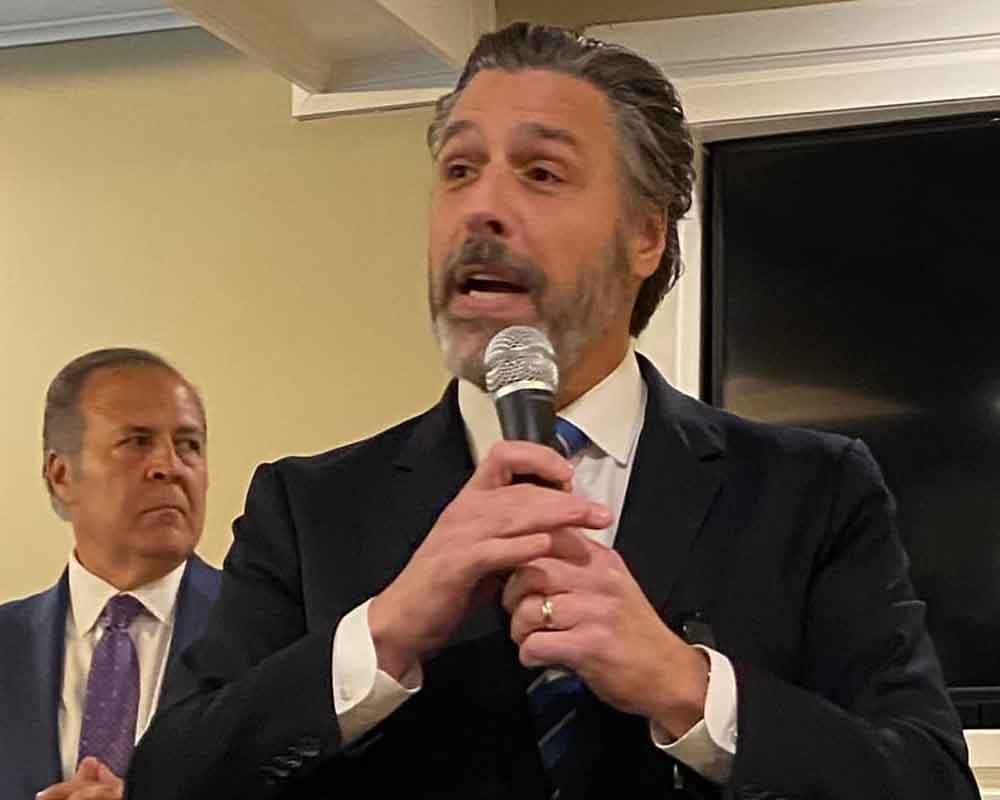PRINCETON, N.J. — Former radio host Bill Spadea is making a third attempt at elected office in the race for New Jersey governor in the 2025 election. Spadea, 55, stepped down from his position at New Jersey 101.5 in January to focus on his latest attempt to get into public office.
Spadea is hoping he can avoid striking out in his third bid for public office in June, but a mounting controversy is making his path to being the GOP candidate in November a bit harder.
Key Points
- Bill Spadea is running for New Jersey governor after two previous election losses.
- His campaign is facing scrutiny over $225,000 in PAC payments to his own LLC.
- Spadea is competing in a crowded GOP primary scheduled for June 10.
Spadea previously ran for Congress in 2004 and a state Assembly seat in 2012, losing both races by large margins.
He has been trying to get into public office for more than twenty years. Unlike his opponents who have successfully won elections and served in public office, Spadea is hoping this time is his time.
His current bid comes as the Republican primary heats up with challengers including former Assemblyman Jack Ciattarelli and state Sen. Jon Bramnick. Spadea is leaning heavily on his name recognition from years in conservative media and his alignment with “Trump” policies to appeal to Republican voters.
“I’m not a career politician,” Spadea said in a campaign ad, despite trying to get into office for two decades. “I’ve spent my career listening to New Jerseyans, and I’m running to fight for them.”
Spadea’s failed campaign to defund the Toms River school district remembered
In 2018, before New Jersey Governor Phil Murphy’s S2 funding took effect, Spadea battled the Toms River School Board, Major League baseball player Todd Frazier and UFC Champion Frankie Edgar.
The board was attempting to pass a referendum to repair leaky roofs, fix deteriorating sidewalks, and repair an aging infrastructure. He fought hard to keep the district from making those much needed improvements, using his radio station as a bully pulpit.
The town eventually rejected Spadea’s political campaign, defeating him in a landslide, approving the referendum to improve the school district.
You can say Spadea was pushing S2 cuts long before Phil Murphy did.
Past defeats and rising stakes
In 2004, Spadea garnered under 40% of the vote in New Jersey’s 12th Congressional District.
His 2012 state Assembly bid ended in a lopsided defeat at the Republican convention, where he received only 52 delegate votes.
Despite those setbacks, Spadea is confident his media background and grassroots base can make a difference this cycle.
He is promoting a platform that includes cutting property taxes, overhauling school funding, and enforcing immigration laws. Endorsements from groups like New Jersey Right to Life have added to his profile among socially conservative voters.
Many of the candidates Spadea endorsed in recent election cycles have lost, questioning Spadea’s radio show influence and whether or not he is actually a ‘brand name’ in the state of New Jersey. His political career was been marked with defeat after defeat, but now, he’s finding financial success in politics, if not political success.
Donations raise ethical questions
This time it’s different. Spadea has a major campaign fundraising framework under him in the name of Theresa Mondella and Ocean County GOP Chairman George Gilmore. Gilmore, who was arrested and convicted by the Department of Justice, was pardoned by President Trump in 2021.
Now, Spadea’s campaign is under fire over payments from his Common Sense Club PAC to his own business, BillSpadea.com. Public filings show $225,000 in transfers through February, with some weeks topping $6,000. Ciattarelli’s campaign claims the real total exceeds $250,000, alleging misuse of donor funds.
That organization has also paid Gilmore a substantial sum of money where he serves as a senior advisor.
“He’s been part of the system, taking money from donors to pad his own pockets,” Ciattarelli said during a recent debate.
Spadea’s campaign denies any wrongdoing. His manager, Mike Hahn, called the criticism “lawfare” and said all spending followed legal guidelines, arguing that the funds covered legitimate campaign expenses during Spadea’s transition from radio to politics.
Still, others feel Spadea and his Common Sense Club organization took money from hard working Americans and put it in his own pocket.
Despite the controversy, Spadea continues to attract financial support, mostly through small-dollar donations averaging $11.14. However, reports have emerged of out-of-state donors mistakenly believing their money was going toward Donald Trump’s efforts rather than Spadea’s own campaign.
With the Republican primary set for June 10 and the general election on November 4, the next few months will determine whether Spadea’s third run will succeed—or end like the last two.
